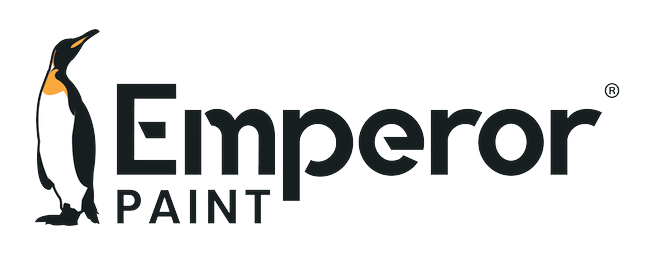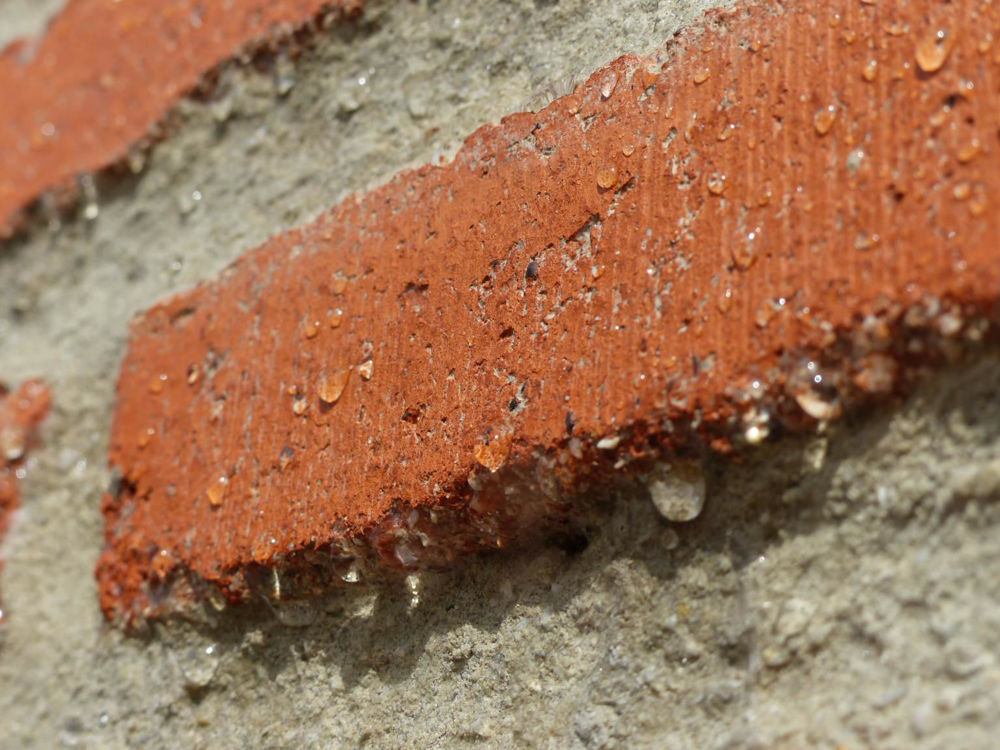
Brick sealer is a term that gets thrown around a lot these days, but what exactly is a brick sealer, what does they do & should you use them? Our team of experts have put together this complete guide to brick sealers so you can find out everything you need to know in one place.
What Is A Brick Sealer?
The terms 'brick sealer', 'brick sealant' or 'masonry sealer' have been around since the 1980's, often referring to a form of water seal that is applied to brick, stone or concrete walls to create a waterproof surface. It does this by creating an invisible waterproof film on the surface of the brick that prevents any water from absorbing into the substrate.
Why Would You Use A Brick Sealer?
You may be thinking, why does a brick need to be waterproofed, surely they are already waterproof? The truth is, natural mineral surfaces like brick & stone are porous, meaning they absorb moisture. When this moisture absorbs into the substrate, it can cause a number of problems for properties.
1. DAMP
The first problem is relating to damp. This is equally problematic for solid wall constructions as it is for properties with a cavity wall. When the moisture soaks into the exterior wall, it can be transferred through to the internal wall of the home. With a solid wall construction there is simply one wall, which means the moisture can easily pass into the interior of the home.
With a cavity wall construction, this cavity wall is designed to prevent this transfer of moisture. Having said this, when a cavity wall is filled by cavity wall insulation, it can remove the gap that prevents moisture from entering or escaping the building. Poorly fitted insulation can also cause damp problems when unfilled mortar joints, debris and wall ties covered with mortar act like a bridge for moisture to pass to the interior of the home.
No matter what type of construction your property is, moisture is likely to be able to transfer through your external wall. Penetrating damp caused by rain absorbing into exterior walls can cause significant long-term damp problems that can be the nightmare for many homeowners, not only causing internal damage, but also causing health issues relating to 'black mould'.
2. STRUCTURAL DAMAGE
Moisture can cause substantial damage to external walls if allowed to penetrate. When the moisture enters into the brick, stone or concrete wall, it can undergo a freeze-thaw cycle, which will cause the water to expand by up to 9%. Once the moisture expands, it applies pressure on the surface of the brick, leading to 'spalling'. This spalling results in the brick or stone cracking or flake away at the surface which in turn can allow more moisture to absorb into the wall. This water ingress will eventually result in blown brick faces and large sections of the masonry crumbling.
3. APPEARANCE
Away from the deterioration of buildings materials, moisture entering an exterior wall will impact the kerb appeal of your home. Further to the wear & tear to the bricks that cracking will cause, the moisture will lead to other problems such as discolouration of the brickwork and large-scale green growth, moss & lichens that thrive in the moist conditions on a wet exterior wall. All of these will greatly impact the kerb appeal of your home.
Lastly, salt efflorescence can is an all to common problem when it comes to moisture. This appears in a white, powdery deposit on brick, stone or concrete walls that is a result of salt within the masonry. When the water enters the masonry, it dissolves the salts within the material, which then migrates out of the wall when the water evaporates. This causes large patches across the brick that are very recognisable to homeowners across the UK. Although not a structural issue, it is an indicator that your exterior walls are absorbing moisture, which can cause damage down the line.
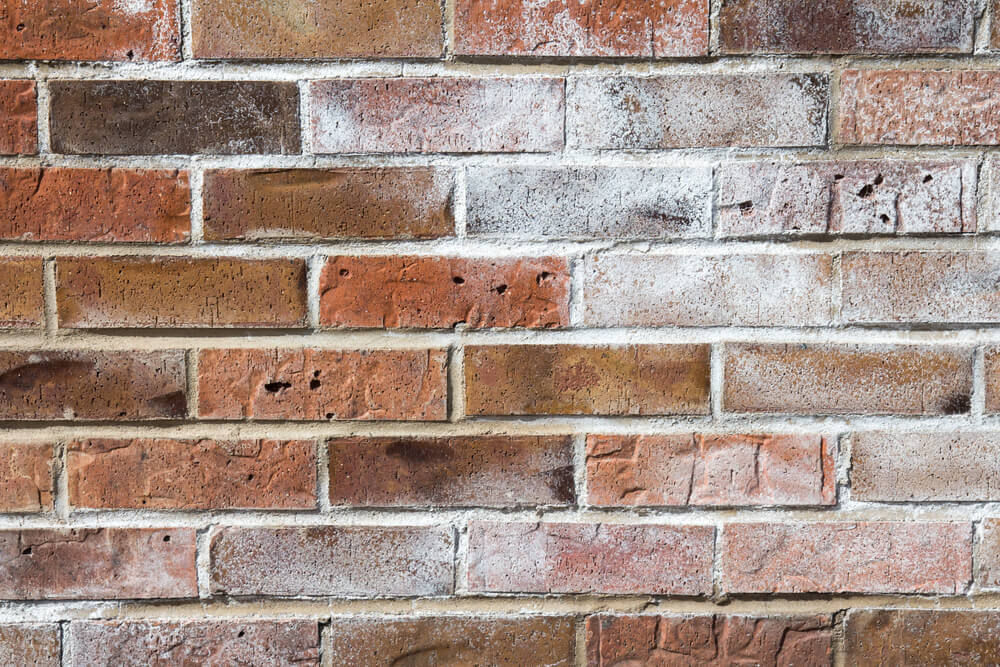
Should You Use A Brick Sealer?
As we have established any bricks are prone to water ingress, which will eventually lead to damp, damage & will reduce you homes kerb appeal. So a clear, waterproof treatment that will prevent this moisture without changing the appearance of your bare brick would sound like a good idea. The answer is yes & no. Yes, a waterproof treatment is ideal, however a brick & masonry 'sealer' is not a good idea.
The term sealer or sealant refers to a product that 'seals' a surface, preventing moisture from entering. The vast majority of the sealers do this by creating a film on the surface, which acts as the waterproofing layer. Unfortunately, there are a number of problems with this. The first of which is that this film can be weathered and pulled off the brick or stone in a short period of time. This will cause the sealer to fail once the film has been bypassed. The second issue with a film creating sealer is that these are more often than not non-breathable. If a sealer is is not breathable, any moisture that is present within a property will become trapped. This moisture naturally builds up inside a property due to condensation and is unavoidable. Once the moisture is trapped, it will build up and lead to signficant damp problems and structural deterioration. Eventually, it will build up beneath the film of the sealer, causing it to fail.
A waterproof coating must have an SD value of below 1 in order to be considered breathable. If a sealer or sealant is not breathable, DO NOT apply this to your property as it could have terrible consequences. Not only will the sealer eventually fail, but damp problems will be made much worse as the moisture is left unable to escape. This is in complete contrast to the desired outcome of using a brick sealer, which is often in response to preventing penetrating damp.
What Should You Use To Waterproof Brick?
If you would like to waterproof exterior walls, you must ensure you use a breathable treatment. The best form of clear waterproofing treatment is what is known as a 'masonry cream'. These are clear, gel like treatments that chemically bond to brick & any other mineral surface, rather than create a film. Masonry cream does this by penetrating into the surface, forming a part of the material which in fact means the material itself becomes waterproof, rather than being coated in a waterproofing layer.
You may be wondering, how is it that a masonry cream can repel moisture but also remain breathable? Well, when a masonry cream penetrates into the brick, it lines the pores of the material rather than sealing it completely. The nano-technology does not allow water to pass through the treated surface, however it will allow water vapour to escape. This ensure that while rainwater will not soak into the brickwork, it will naturally breathe, allowing any water vapour to escape the property. This ensures long-term protection from damp & damage that will far outperform a brick sealer in terms of longevity and ability to prevent water absorption.
What Is The Best Masonry Cream?
When it comes to masonry cream, there are a number of options on the market. Having said this, here at Emperor Paint, we have developed the most advanced technology available in the UK with our Emperor Masonry Creme.
Emperor Masonry Creme uses the latest super-hydrophobic technology that completely repels water from walls that it is applied to. The word super hydrophobic refers to the ability for the treatment to cause water droplets to bead on the surface, which will run straight off a wall. This is known as the 'lotus effect' and is seen across nature, such as on lotus leaves or the wings of certain insects.
Unlike film forming brick sealers, the masonry cream penetrates brick, stone & concrete up to 17mm, forming part of the material, thus ensuring it can perform long-term without becoming compromised.
In an independent test carried out by UKAS accredited laboratory Lucideon, the masonry cream was subject to a 25-year weathering process. This aimed to test how it would fair if put under heavy weather conditions for an accelerated 25-year period. The investigation would test the performance of the products longevity, the breathability, the ability for it to prevent water ingress and the ability for the product to retain heat on a brick wall. The results of the investigation found that all four tests were successfully passed.
The results of the tests demonstrated that Emperor Masonry Creme:
- Over the course of the test, there was no deterioration of performance of appearance on the brick wall treated with Emperor Masonry Creme
- Reduced water absorption by 96.3%
- On average a wall treated with Emperor Masonry Creme was found to be 6°C warmer on average when compared against a non-treated wall
- Maintained excellent breathability with an SD value of 0.56, while a non-treated wall had an SD value 0.57. This demonstrated that almost full breathability was maintained and the coating achieved the below 1 SD value that defines a breathable coating
Although Emperor Masonry Creme was demonstrated to have a 25-year life expectancy, the treatment had shown no signs of deterioration after this time. Due to this, we are so confident that the masonry cream will far outperform this, we offer a full lifetime guarantee on all products. This means that if your masonry cream stops performing, we will replace the product no question asked.
A largely unknown benefit of super hydrophobic technology is that it is self-cleaning. As water cannot attach to the treated masonry, the same applies to dirt. Any rain water will simply clean off dirt that is deposited on the wall. As well as this, lichens and other green growth will struggle to grow on the wall. This is a common problem for any surface, but especially bare brick as the rough surface can make it easy for this growth to gather. Overall, the super hydrophobic technology will keep brick, concrete & stoned walls completely pristine, making it a perfect solution if you want to keep your exterior walls clean & attractive.

How To Apply Masonry Cream
If you have decided that a masonry cream is the best fit for you, then it is time to discuss how you apply it. Here is our experts step-by-step guide to applying masonry cream and waterproofing your exterior walls.
YOU WILL NEED:
- Masonry cream
- A long-pile roller &/or paint brush
- Paint tray
- Dust brush
- Sandpaper
- Dust sheets
- Masking tape
1. PREPARATION
The first stage of any decorating project is preparation. This, as any professional decorator will tell you, is there most important aspect of achieving long-lasting results. First, begin by ensuring the surface is clean. If you suffer from efflorescence or have any large areas of moss or debris, remove this using a stiff brush.
If there is any paint on the brickwork, you must remove this before applying the masonry cream as this is for a bare, mineral surface only. If you want to waterproof painted brickwork, you can use a waterproof masonry paint.
While ensuring the surface is dry, apply the Emperor Paint Exterior Masonry Cleaner. This is an anti-fungal cleaner that removes moss and algae that if left on the masonry could impact the ability for the masonry cream to perform. Simply apply neat to the masonry and leave for three hours. After this period, wash down with water and leave to completely dry.
You can then inspect the brickwork to see if there are any cracks or holes that will impact the finished results. Before filling, ensure you remove any debris or loose material from the crack or hole as this could cause you problems. You can then fill the crack or hole using a good quality exterior filler, working the filler back and forth in straight lines using a filling knife. Leave to dry completely and sand down using sandpaper to get a smooth finish.
The final step is to apply masking tape along any the edges of areas you do not want to apply masonry cream, such as doors and windows. Then put down a dust sheet on the floor to reduce any unnecessary clean up that may be required if you spill the masonry cream.
2. APPLYING MASONRY CREAM
Once the surface is clean & sound, it is time to apply the waterproof treatment. You do not need to apply a primer as the masonry cream is a clear treatment that will penetrate the surface. A primer is designed to create a sealing base for a coloured paint to be applied to, preventing the paint from absorbing into the wall. If you decide you would like to paint your bare brick in a masonry paint, ensure you use a primer first. Before starting, make sure conditions are dry and above 5°C as the masonry cream will not dry in those temperatures and in the rain will simply be washed off the wall. A wall treated with masonry cream will be rainproof in an hour at 20°C , although it will take longer than this to completely cure into the masonry.
You can apply the masonry cream using a brush, roller or a spray machine depending on your preference. It is a thick consistency which is unlike a typical paint, so be mindful that it will apply thicker than expected.
You are aiming to achieve an even coating of the masonry cream that is predominantly white, but you can still see parts of the brick underneath. Please see the picture below for a perfect example of the thickness you should apply the masonry cream at.
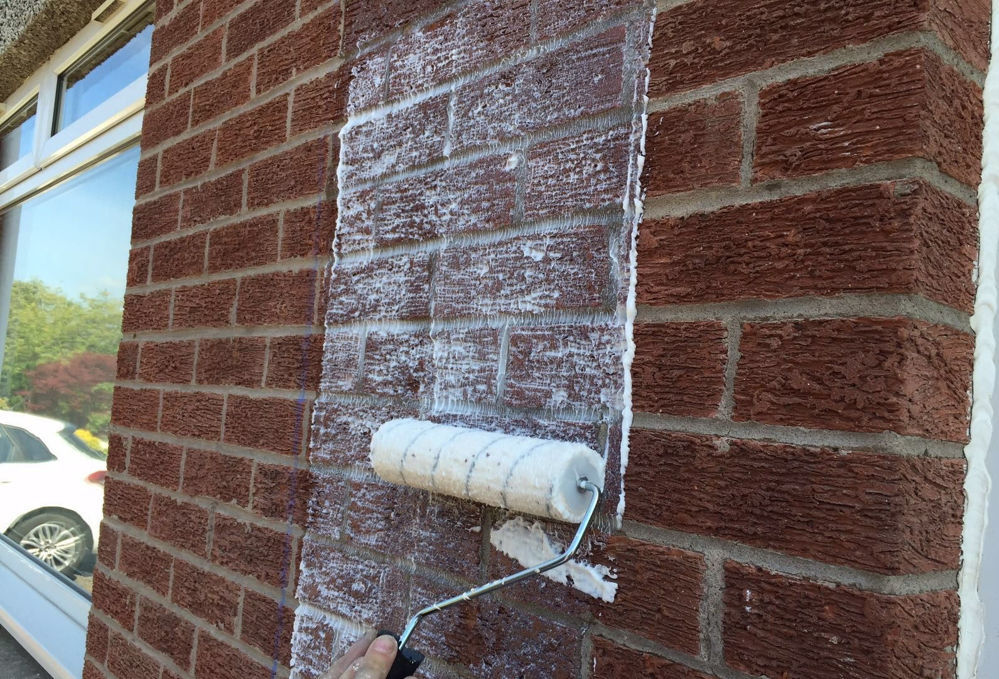
If you apply to much of the masonry cream in one area, simply use a paint brush to spread the cream evenly as you want to avoid any large deposits that will dry at different rates. The optimal coverage for the masonry cream is 3-5m² per litre, with only one coat required. Once the full wall is treated, it will take approximately 2 hours to begin to see water repellent properties of on the brick once applied, although it will take over 24 hours for it to fully cure into the wall. You will see the masonry cream has completely cured once you cannot see any white residue on the brickwork.
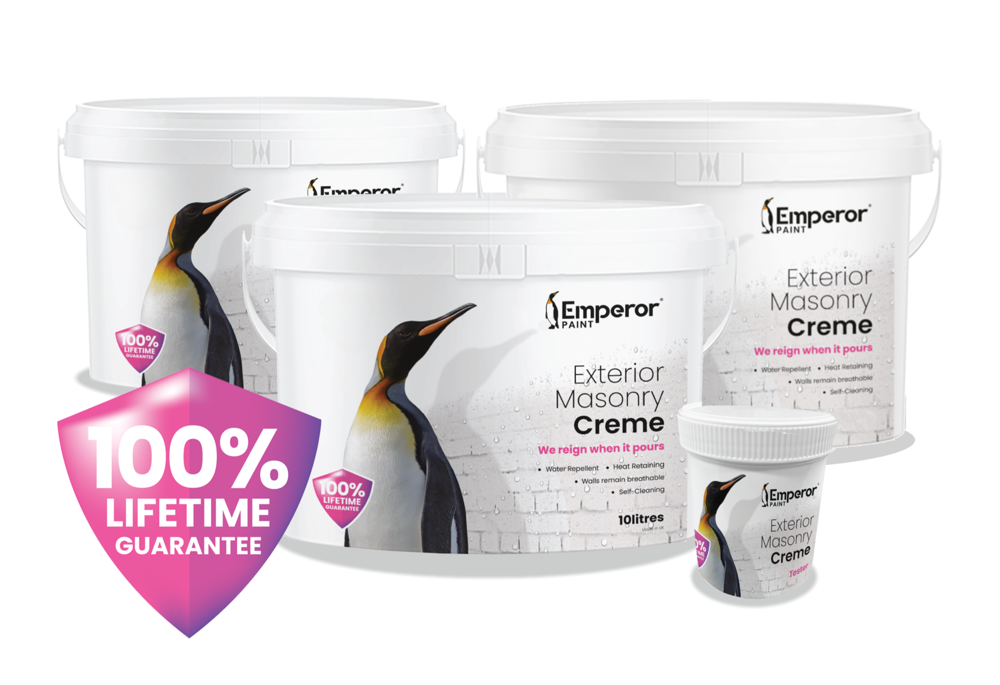
Frequently Asked Questions
Q. WHAT SURFACES CAN MASONRY CREAM BE APPLIED TO?
Masonry cream can be applied to any mineral walled surface. This means whether it is brick, stone, concrete, sandstone, limestone or mortar, the treatment will be able to penetrate and waterproof the material.
Q. DOES IT LEAVE A FINISH?
Emperor Masonry Creme does not alter the appearance of masonry at all. Some brick sealants create a 'wet look', which is not the case with this product.
Q. CAN YOU PAINT OVER MASONRY AND BRICK SEALERS?
In no way should you mix sealers/masonry creams with paints. A masonry cream for example will repel moisture, meaning any paint that is applied on it will not adhere. Further to this, if you apply a non-breathable paint over the top of a masonry cream, you will lose the water repellent and breathable properties.
Further to this, you cannot apply a masonry cream over the top of paint as it must be able to penetrate into the brick. If you want to waterproof an exterior wall that has been previously painted or that you are planning to paint, opt for a waterproof masonry paint. Emperor Masonry Paint contains the same super hydrophobic technology as Emperor Masonry Creme, but in a coloured masonry paint. While it will not penetrate into the brick, it will still remain breathable and completely waterproof.
Q. HOW LONG DOES A BRICK SEALER LAST?
Many brick & masonry sealers have a lifespan of under 5 years, although first-hand accounts of using some products has indicated they can only last a matter of 12 months on occasion. Masonry creams last between 10-25+ years depending on the one you opt for. Emperor Masonry Creme for example has a 25 year proven performance, although it is extremely likely to far exceed this which is why it comes with a lifetime guarantee.
Q. HOW MUCH MASONRY CREAM DO I NEED?
You need to know a few things when painting or coating an exterior wall; the coverage of the product, the area of the surface and the number of coats. Masonry cream is a one-coat product, that in the case of Emperor Masonry Creme has a coverage of 3-5m² per litre. This makes it much easier to work out how much you will require when compared to paints that require multiple coats. On a property of 40m², you will expect to need roughly 10 litres of masonry cream.
We hope this guide has answered any questions you may have had regarding brick sealers & how to waterproof brick walls. If you have more questions, we are here to help with our full technical support from our in-house team of experts. Talk to one of our experts today or find out more about Emperor Paint products.

